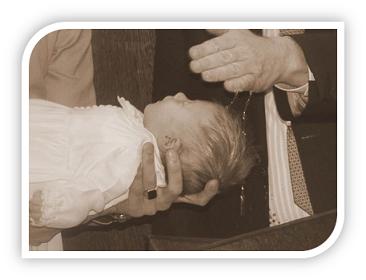Educating the Covenant Child
Educating the Covenant Child
Probably when we read the title of this article, our minds are immediately a bit skeptical on reading the words "covenant child." What is meant by these words? Are they not dangerous words? Are these words Scriptural? Should we use these words?
It is good that the words "covenant child" raise questions in our mind of serious concern. In many Reformed circles these words are abused and explained in a way that is not according to Scripture. We think only of the followers of Dr. Kuyper who emphasized the words "covenant children" in such a way that they believed that covenant children were presumed to be regenerated. This has led to a church full of people who see no need to be "born again."
 Should we then avoid the use of the words "covenant children"? By no means. But why? Why must we use the words "covenant children" when it has caused so much error and apostasy in the church? The reason is that the idea of covenant children is taught in the Bible and therefore has a lesson for us. It is not the lesson of Dr. Kuyper and his followers but it does have a very important lesson for us also.
Should we then avoid the use of the words "covenant children"? By no means. But why? Why must we use the words "covenant children" when it has caused so much error and apostasy in the church? The reason is that the idea of covenant children is taught in the Bible and therefore has a lesson for us. It is not the lesson of Dr. Kuyper and his followers but it does have a very important lesson for us also.
All children who are baptized and are members of the church have a covenant relationship with God. But there is a two-fold relationship. Those who by God's grace become children of God are true and essential members of that covenant. Those who remain unconverted have only the signs of a covenant member. This is illustrated in our being a member of a nation. We can be a citizen without really loving our country. But a true citizen is one who not only has the sign but is also a citizen in heart. This same distinction was made in Old Testament Israel. Christ spoke of "not all Israel is Israel." There is abundant Scripture testimony of this fact (Romans 2:28,29, Romans 9:6-8, Matt. 3:7-10, John 8:37-39, John 3, Rom. 8:14, 1 Cor. 10:1-5). In other words, some Israelites were Israelites in name only, and others were Israelites also in heart. But as far as their obligations and responsibilities were concerned, they were one nation under one covenant before God. God laid upon the unconverted Israelites the very same obligation to walk in His way as He did upon the converted. This leads us to the lesson that the idea of covenant children has for us.
The lesson that it has for us has to do with education. Children of the covenant must be educated differently from those who are not of the covenant. To see this, we must go back to the Old Testament where the children of Israel were brought up and educated according to the true meaning of the word "covenant children." There they were not assumed to be regenerated as Dr. Kuyper taught, but parents laid upon their children the obligations and privileges that Scripture places upon a covenant relationship.
Israel indeed had a special relationship with the Lord. No other nation enjoyed the precious promise given to Abraham and his seed. Israel was a special nation – it was a covenant nation. The children born into that nation were special children – they were covenant children. They, as children of Abraham, received the mark of circumcision; they learned God's law; they knew of God's protection and chastisements, as they were reminded of their need of a Savior (Romans 3:1,2). But even more importantly, it was among them that God promised to especially bless His Word to the salvation of many. They, as none other, received continuously the callings and invitations of the gospel. These were privileges that the children of Abraham enjoyed and the God-fearing cherished these privileges. They could teach their children to pray. "Lord, I am circumcised in Thy Name. Bless Thy Word and all the benefits of my circumcision to me in a saving way. Please give me the deepest meaning of circumcision, please wash me clean in Thy precious blood."
You can imagine that in such a society the children were very important. With what diligence and zeal did the fathers and mothers teach their children how to live before God! They reminded their children that they were circumcised and that this circumcision meant that they belonged to God. They told them that God had a special right to their obedience and that they had a special obligation to serve the Lord according to His law. God had given them and their nation His Word, His help, His promises, and His protection, and He expected more from them in return. In short, they trained their children with the fact in mind that God had a right to their service. It was not put to them that they could freely choose if they wanted to serve God. No, it was their divine covenant obligation to walk in God's ways. They must obey because they belonged to God.
Does this mean that Gentile children had no obligation to walk in God's ways? It certainly does not mean this. Like non-church members today, they do have an obligation but only by virtue of being a creature created by God. But a double emphasis was laid upon the covenant child. If he failed to walk in God's ways, he not only violated his created purpose, but also his covenant mark and relationship.
A simple analogy may help to make this clear. A child brought up in a royal family who received many blessings early in his life would be especially ungrateful and out of place if he were to live in slums and take part in a life of shame and crime. Though no one is allowed to live a life of shame and crime, his relatives could rightly point to His royal birth and heritage and say, "You don't belong here. With your upbringing, you have no right to be acting like this. You are not acting like a true child of your parents.''
The covenant children in Israel were like that child. Their parents gave them the mark of God's kingdom and then diligently sought to train their children according to the meaning of the mark.
"To the utmost of their power" they sought to teach their child to live according to all the laws of the Lord. It was a shame, an embarrassment, and a confusion to the family whose child turned from the ways in which he was appointed to live.
Parents of circumcised children had a special obligation also in such a society. Along with the circumcision mark, God required the parents to diligently teach their children. If parents would not diligently teach their children, their actions would be a gross inconsistency with the mark their children received. The mark of circumcision stood for what their children were bound to be, but then only if they trained their children accordingly.
So we see that the covenant children, according to their mark of circumcision, were bound to walk in God's ways. But parents were by this compelled to teach their children according to this mark also. They were, with all their power, to set before their children God's claim upon them. They also bound and commanded their children to walk in God's law, and because of their sin, to look to Christ for the salvation of their souls. To act any differently would have been a mockery to the sacrament of circumcision.
Parents, we all know that today baptism takes the place of circumcision. The same awesome responsibility rests upon us and our children as what lay upon the children of Israel. By our mark of baptism, we show we belong to God.
God has given us the promise of blessing, He calls us back when we turn from Him, He bids us look to the cross for salvation. And His mark upon us shows that we are dedicated to Him. To act or live contrary to the mark of baptism is a gross mockery of the sacrament of baptism. If we knew of someone who regularly attended the Lord's Supper but who openly lived wickedly, we would say his life is a mockery against the Lord's Supper. So the life of us and our children is a mockery of baptism when we do not live as if our whole life is dedicated to God and to His commandments.
To educate a covenant child is not only to acquaint him with God's law and ways but also to say to him that he is "claimed" to live according to his sign of baptism. His baptismal mark must be pointed to and he must be told that if his life is not according to that mark, he is a living mockery of God's sacrament of baptism. But we also may and must plead with God to fulfill His covenant promises and make our children His children in the deepest sense.
Parents, what an awesome responsibility lays upon us. We must, according to the mark of baptism, "Call our children to walk in God's ways," but we can only rightly do this when our teaching is consistent with that baptism. God will not only come to our children and say, "What are you doing with your baptized forehead in such a place?" but he will also come to us and say, "Why are you not teaching your children diligently to the utmost of your power as you have promised in baptism?"
In sum, what then is a covenant child? He is an Old or New Testament child who has received the mark of circumcision or baptism and thus carries the sign of one who belongs to or is dedicated to God. Are our children covenant children? Yes, when they were baptized they received the mark of being a member of the covenant promises and responsibilities God laid upon Israel. Does "covenant children" mean "saved children"? No, it definitely does not. It instead means that they are marked as dedicated to and belonging to God. Whether they actually are circumcised or baptized in heart depends only on God's regenerating Spirit. What is the difference between educating a covenant child and one who is not a covenant child? We must not only teach the covenant child God's laws and ways, but we must "claim" and demand that they walk in them. They have been dedicated to God and we must demand and claim that they live accordingly. We may and must plead with the covenant God to bless His means of grace to them savingly. Then we must do everything to the utmost of our power to teach them according to the promise of baptism. God asked us to plead His covenant promises which He has promised to bless. Our children are not our own; we have given them to God in baptism. Do we show in actual practice that we want them to belong to God?  Or have we secretly accepted the fact that it is "normal" for our children to live apart from God? May God keep us from such a false place of rest. Oh, may we earnestly plead with the Lord and say, "Lord, I am not a true child. My nature and the nature of my children show that we don't want to belong to thee. But change my heart. Show mercy to me. Work in my heart a desire to rededicate myself and my children to thee. And help me to train my children to feel the responsibility of Thy claim upon them.''
Or have we secretly accepted the fact that it is "normal" for our children to live apart from God? May God keep us from such a false place of rest. Oh, may we earnestly plead with the Lord and say, "Lord, I am not a true child. My nature and the nature of my children show that we don't want to belong to thee. But change my heart. Show mercy to me. Work in my heart a desire to rededicate myself and my children to thee. And help me to train my children to feel the responsibility of Thy claim upon them.''
Our children are not covenant children for nothing. God has a special claim upon them and we as parents have a special responsibility. If our or their actions show that we are not dedicated to God, we abuse the sacrament of baptism. May God cause us in our need and great shortcomings to flee to a throne of grace for grace to bring up our children in the way they should go.

Add new comment